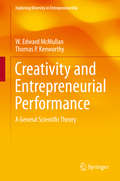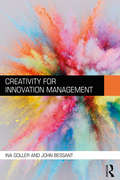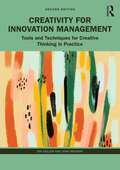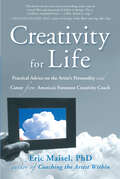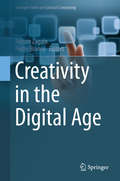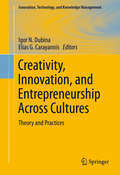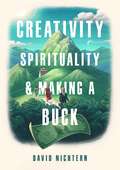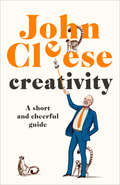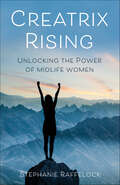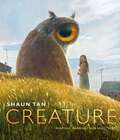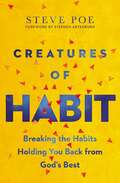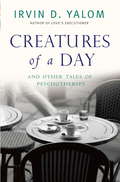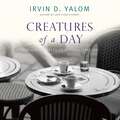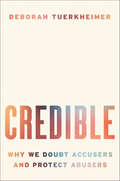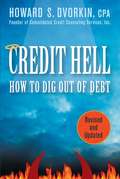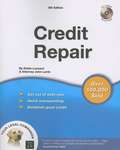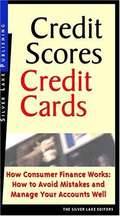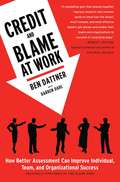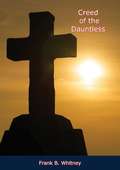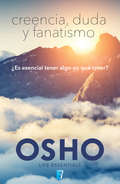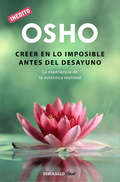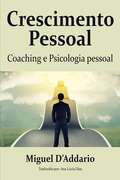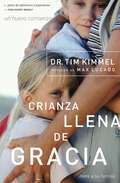- Table View
- List View
Creativity and Entrepreneurial Performance: A General Scientific Theory (Exploring Diversity in Entrepreneurship)
by W. Edward Mcmullan Thomas P. KenworthyThe essential problem in entrepreneurship is improving the performance of entrepreneurs. The most important theories will be the ones that most enable us to predict and then ultimately influence entrepreneurial performance. This book develops a new and more accurate theory of entrepreneurial performance based in entrepreneurial creativity. The field of entrepreneurship has a long tradition of expecting entrepreneurial performance to be influenced by creativity, tracing back even before the pioneering work of Joseph Schumpeter (1883 to 1950), who defined entrepreneurship as creative-destruction--creating the new by supplanting or destroying the old. Subsequently, psychologist Robert Sternberg defined creativity as broadly encompassing creative aspects of personality, motivation, intellect, thinking style and relevant knowledge. Using Sternberg's definition of creativity, the authors reviewed the evidence directly linking entrepreneurial creativity and entrepreneurial performance, concluding that the linkage is both statistically and practically significant. In order to scientifically tie entrepreneurship to creativity the book pursues a number of major objectives: In parts one and two, the authors remind us of our scientific challenge in the light of the depressing levels of performance typically to be found in the real world of entrepreneurship and explores the limitations of the dominant paradigms driving research in the field of entrepreneurship today. In part three, they bring together existing evidence to demonstrate the predictive and explanatory powers of creativity in relation to entrepreneurship. In part four, they further explore correlations between creativity and entrepreneurial performance at the individual and macro or society, levels. In summary, the book offers a bold predictive theory linking entrepreneurial creativity to entrepreneurial performance, however neither as boldly as a definitional linkage nor as timidly as one in a hundred or so factors potentially explaining entrepreneurial performance. This result is a general scientific theory that offers a serious challenge to entrepreneurial scholars who are pursuing other means for understanding the causality of entrepreneurial performance.
Creativity for Innovation Management
by John Bessant Ina GollerCreativity for Innovation Management is a rigorous yet applied guide which illustrates what creativity is, why it matters, and how it can be developed at both individual and group levels. Unlike many technique-oriented books, this book will combine theory and practice, drawing on the latest research in psychology, organizational behaviour, innovation and entrepreneurship. This exciting new text outlines the necessary skills and competences for innovative and creative processes. It provides opportunities to explore these and also to develop them via a wide variety of activities linked to relevant tools and techniques, as well as a range of case studies. By working through key competence areas at personal and then team levels, students then have an opportunity to practice and enhance these skills. This will be complemented by online resources which will provide students with access to key tools and techniques plus activities to help develop their creativity. This textbook is ideal for students of innovation, management and entrepreneurship, as well as professionals in those industries that want to excel by developing and applying their own creativity at work.
Creativity for Innovation Management: Tools and Techniques for Creative Thinking in Practice
by John Bessant Ina GollerCreativity for Innovation Management is a rigorous yet applied guide, which illustrates what creativity is, why it matters, and how it can be developed at both individual and group levels. Unlike many technique-oriented books, this book combines theory with practice, drawing on the latest research in psychology, organisational behaviour, innovation and entrepreneurship. The text provides a range of opportunities to explore innovative and creative processes and develop them via activities linked to relevant tools and techniques, as well as real-life case studies. By working through key competence areas at personal and then team levels, the book demonstrates to students how to build entrepreneurial practices, strong, innovative teams, and organisations that encourage and facilitate innovative thinking. This second edition has been updated throughout, including a new chapter exploring the impact of emerging technologies on creativity, further material on human-centred design, crowdsourcing and collaboration platforms, and cross-cultural differences in innovation management. This textbook is ideal for postgraduate students of Innovation and Creativity and Entrepreneurship, as well as professionals who want to excel by developing and applying their own creativity at work. Online resources complement the book, with access to key tools, techniques, and activities, as well as supporting video and audio material and cases, to support learning and teaching.
Creativity for Life: Practical Advice on the Artist's Personality, and Career from America's Foremost Creativity Coach
by Eric Maisel PhDAs a therapist and creativity coach, Eric Maisel has worked with thousands of creative people. He knows firsthand the struggles that writers, musicians, artists, dancers, and actors face and has helped them find balance in their lives while pursuing their artistic endeavors. His new book presents a comprehensive approach to the much-misunderstood life of the artist. Creativity for Life offers practical ideas as well as exercises and inspiration to nurture growth as an artist and as a person, exploring such subjects as: Establishing your creativity practice Obscurity and stardom Blocks The artist’s personality Moods and madness Artists in love Craft The rewards and perils of isolation Social interactions and community
Creativity in the Digital Age (Springer Series on Cultural Computing)
by Nelson Zagalo Pedro BrancoThis edited book discusses the exciting field of Digital Creativity. Through exploring the current state of the creative industries, the authors show how technologies are reshaping our creative processes and how they are affecting the innovative creation of new products. Readers will discover how creative production processes are dominated by digital data transmission which makes the connection between people, ideas and creative processes easy to achieve within collaborative and co-creative environments. Since we rely on our senses to understand our world, perhaps of more significance is that technologies through 3D printing are returning from the digital to the physical world. Written by an interdisciplinary group of researchers this thought provoking book will appeal to academics and students from a wide range of backgrounds working or interested in the technologies that are shaping our experiences of the future.
Creativity, Innovation, and Entrepreneurship Across Cultures: Theory and Practices (Innovation, Technology, and Knowledge Management)
by Elias G. Carayannis Igor N. DubinaThe aim of this volume is to further develop the relationship between culture and manifold phenomena of creativity, innovation and entrepreneurship in order to promote further and better understanding how, why, and when these phenomena are manifested themselves across different cultures. Currently, cross-cultural research is one of the most dynamically and rapidly growing areas. At the same time, creativity, inventiveness, innovation, and entrepreneurship are championed in the literature as the critical element that is vital not just for companies, but also for the development of societies. A sizable body of research demonstrates that cultural differences may foster or inhibit creative, inventive, innovative and entrepreneurial activities; and each culture has its own strengths and weaknesses in these regards. Better understanding of cultural diversity in these phenomena can help to build on strengths and overcome weaknesses. Cross-cultural studies in this field represent a comparatively new class of interdisciplinary research. This is a field where cultural, sociological, psychological, historical, economic, management, technology and business studies closely intersect. In this book, a global team of researchers representing Europe, Asia, and the Americas review, analyze, structure, systematize and discuss various concepts, assumptions, speculations, theories, and empirical research which focus on the effect of national cultures on creativity, invention, innovation, and entrepreneurship. They argue that national culture is not only an extremely important determinant of innovation and business development, but also demonstrate that some aspects relating to these phenomena may be universal among all cultures, thereby identifying those factors that may easily be transferred across cultures from those that are unique to their specific context.
Creativity, Spirituality, and Making a Buck
by David NichternA friendly, funny, practical guide for creatives and entrepreneurs, written by a four-time Emmy award-winning and two-time Grammy-nominated composer-guitarist-producer who has worked with Paul Simon, Stevie Wonder, Jerry Garcia, Lana Del Rey, and Krishna Das, among many others. Also a beloved and highly regarded Buddhist teacher, David teaches readers how to integrate their creative process with their spiritual practice and livelihood.“How do I make a living doing what I love?” “Am I a sellout as an artist if I want to be successful?” “How do I integrate my spiritual principles with the art of running a business? And actually, um, how do I run a business?” Wondering how to reconcile your calling with your need to make a living wage, or what to do once your art starts selling, or how to achieve success in your field, or what it even means to be successful? David Nichtern offers his lived, learned experience as an entrepreneur, musician, and Buddhist teacher to first help you figure out what “success” means to you and then show you how to get there. He offers advice on the creative process and principles of business and ethics—everything from “listen to the muse!” to “protect your intellectual property!”—and provides mindfulness exercises to help you integrate inspiration and aspiration, vocation and avocation—to go from surviving to thriving. Whether you’re a baker trying to grow from the farmer’s market to a brick-and-mortar or a CEO exploring how taking care of your employees can be the same as taking care of your business—if you’re trying to align your spiritual, creative, and financial pursuits and discover what it means to truly live well, this book is for you.
Creativity: A Short and Cheerful Guide
by John CleeseThe legendary comedian, actor, and writer of Monty Python, Fawlty Towers, and A Fish Called Wanda fame shares his key ideas about creativity: that it&’s a learnable, improvable skill.&“Many people have written about creativity, but although they were very, very clever, they weren't actually creative. I like to think I'm writing about it from the inside.&”—John Cleese You might think that creativity is some mysterious, rare gift—one that only a few possess. But you&’d be wrong. As John Cleese shows in this short, practical, and often amusing guide, it&’s a skill that anyone can acquire. Drawing on his lifelong experience as a writer, Cleese shares his insights into the nature of the creative process and offers advice on how to get your own inventive juices flowing. What do you need to do to get yourself in the right frame of mind? When do you know that you&’ve come up with an idea that might be worth pursuing? What should you do if you think you&’ve hit a brick wall? We can all be more creative. John Cleese shows us how.
Creativity: A Short and Cheerful Guide
by John Cleese"Many people have written about creativity, but although they were very, very clever, they weren't actually creative. I like to think I'm writing about it from the inside." --John CleeseCreativity is usually regarded as a mysterious, rare gift that only a few possess. John Cleese begs to differ, and in this short, immensely practical, and often very amusing guide he shows it's a skill that anyone can acquire. Drawing on his lifelong experience as a writer, he shares his insights into the nature of the creative process and offers advice on how to get your own inventive juices flowing. What do you need to do to get yourself in the right frame of mind? When do you know that you've come up with something that might be worth pursuing? What do you do if you think you've hit a brick wall? Not only does he explain the way your mind works as you search for inspiration, he also shows that, regardless of the task you've set yourself, you can learn to be better at coming up with a promising idea, refining it, and knowing when you're ready to act on it. We can all be more creative. John Cleese shows us how.
Creatrix Rising: Unlocking the Power of Midlife Women
by Stephanie RaffelockEver since Eve was banned from the garden, women have endured the oftentimes painful and inaccurate definitions foisted upon them by the patriarchy. Maiden, mother, and crone, representing the three stages assigned to a woman’s life cycle, have been the limiting categories of both ancient and modern (neo-pagan) mythology. And one label in particular rankles: crone. The word conjures a wizened hag—useless for the most part, marginalized by appearance and ability.None of us has ever truly fit the old-crone image, and for today’s midlife women, a new archetype is being birthed: the creatrix.In Creatrix Rising, Stephanie Raffelock lays out—through personal stories and essays—the highlights of the past fifty years, in which women have gone from a quiet strength to a resounding voice. She invites us along on her own transformational journey by providing probing questions for reflection so that we can flesh out and bring to life this new archetype within ourselves. If what the Dalai Lama has predicted—that women will save the world—proves true, then the creatrix will for certain be out front, leading the pack.
Creature: Paintings, Drawings, And Reflections
by Shaun TanFrom the creator of THE ARRIVAL, a collection of essays illuminating his thoughts and advice for writers and artists, young and old.Shaun Tan is one of the world's most highly acclaimed narrative artists—his stories and images are loved by countless young and not-so-young readers around the world. Drawing upon 25 years as a picture book and comics creator, painter, and filmmaker, CREATURE explores the central obsession of this visionary artist, from casual doodles to studied oil-paintings. Beyond sketches for acclaimed works such as THE ARRIVAL, THE LOST THING, and TALES FROM OUTER SUBURBIA, this volume collects together for the first time unseen and stand-alone illustrations, each resonant with unwritten tales of their own. Detailed commentary by the artist offers an entertaining insight into the endless allure of imaginary, non-human beings and what they might tell us about our so-called "normal" human selves. Artists, writers, students, dreamers, and anyone interested in the deeper undercurrents of creativity, myth, and visual metaphor will find inspiration in these pages.
Creatures of Habit: Breaking the Habits Holding You Back from God's Best
by Steve PoeBeloved pastor Steve Poe helps Christians identify and break free from the destructive patterns that are keeping them from the joy-filled, flourishing life Jesus promised.We all have both good and bad habits in our life. Creatures of Habit reveals how to remove bad habits and replace them with godly ones. But it's not a matter of working hard, of "pulling ourselves up by our bootstraps." That approach simply doesn't work. True transformation is God's work--our job is to listen, obey, and put into practice what he's already directing us to do.Steve Poe has pastored large, growing churches for more than thirty-four years, and during that time he has counseled hundreds of people. He's seen that poor choices often become bad habits that in turn cause people a lot of problems. Hundreds of things can become a bad habit in our lives, but Poe focuses on the most common, among them:anger,lust,worry,cynicism,pride,self-centeredness, andgreed.Each chapter provides insights, biblical examples, and tangible tools that will help you break the bad habits that can become spiritual strongholds in your life.
Creatures of a Day: And Other Tales of Psychotherapy
by Irvin YalomWhat makes life worth living? What can we do to lead meaningful lives? And how do we confront our inevitable end? In his long career, eminent psychotherapist and author Irvin Yalom has pressed his patients and readers to grapple with life's two greatest challenges: that we all must die, and that each of us is responsible for leading a life worth living. In Creatures of a Day, he and his patients face the difficulty of these challenges. Although these people have come to Yalom seeking relief, recognition, or meaning, he and they discover that such things are rarely found in the places where we think to look. Like Love's Executioner and Yalom's other writing, Creatures of a Day provides an intelligent, compassionate, yet still unflinching look at the human soul and all the pain, confusion, and hope that go with it. The power of these stories is amplified by Yalom's reflections on his own life as he reckons with its inevitable end. Suffused with humor, great artistry, and a profound humanity, Creatures of a Day lays bare the necessary task we each face, each day, to make our own lives meaningful.
Creatures of a Day: And Other Tales of Psychotherapy
by Irvin YalomWhat makes life worth living? What can we do to lead meaningful lives? And how do we confront our inevitable end? In his long career, eminent psychotherapist and author Irvin Yalom has pressed his patients and readers to grapple with life's two greatest challenges: that we all must die, and that each of us is responsible for leading a life worth living. In Creatures of a Day, he and his patients face the difficulty of these challenges. Although these people have come to Yalom seeking relief, recognition, or meaning, he and they discover that such things are rarely found in the places where we think to look. Like Love's Executioner and Yalom's other writing, Creatures of a Day provides an intelligent, compassionate, yet still unflinching look at the human soul and all the pain, confusion, and hope that go with it. The power of these stories is amplified by Yalom's reflections on his own life as he reckons with its inevitable end. Suffused with humor, great artistry, and a profound humanity, Creatures of a Day lays bare the necessary task we each face, each day, to make our own lives meaningful.
Crecer bebiendo del propio pozo: Taller de crecimiento personal
by Carlos Cabarrús PellecerÉste no es un libro para leer, sino un taller, una experiencia vital que solamente puede asimilarse en la medida en la que se realice. Es el producto de más de doce años de trabajo y experimentación de la temática propuesta y su fuente principal, como dice el autor, es su experiencia de haberlo hecho mal como formador. Esto le impulsó a la búsqueda de materiales, de técnicas y, sobre todo, de actitudes que le ayudaran a caminar hacia la madurez.La fundamentación teórica que subyace en todo él es la compilación de varias propuestas terapéuticas. De ellas el autor retoma, amplía, reelabora, adapta y genera, en una presentación libre, los ejercicios y herramientas que se ofrecen. Este material -que se realiza en tres niveles: personal, en grupo de vida y en la puesta en común- se presenta en cinco partes: la construcción de la comunidad, el descubrir y sanar mi herida, el descubrir y potenciar mi manantial, las herramientas terapéuticas y los complementos teóricos.Es importante enfatizar que, en primer lugar, éste no es un libro terminado sino en proceso, pues cada taller lo abre a nuevos ejercicios o a reinterpretaciones de los antiguos; y en segundo lugar, no se trata de un libro de consulta, sino de una herramienta de trabajo: solamente haciendo la experiencia vital de cada instrumento propuesto es posible asimilar la densidad de su efecto, y despertar e introyectar el camino del conocimiento y crecimiento personal que brota del manantial y abre la fuente de agua viva.La página final la escribirá, en definitiva, cada una de las personas que acepten el riesgo de vivir esta experiencia y de dejarse modificar por ella. Carlos R. Cabarrús (Guatemala, 1946) Es Doctor en Antropología Cultural y Licenciado en Filosofía y Teología. Ha recibido una sólida formación, tanto en el campo de la Espiritualidad como en el de la orientación psicoterapéutica (Psicoterapia Experiencial y Focusing, Bioenergética, Gestalt, etc...) Ha sido maestro de novicios de los jesuitas centroamericanos durante cerca de diez años y actualmente es el fundador y director del Instituto Centroamericano de Espiritualidad (ICE) en Guatemala.Sus publicaciones tienen que ver con las dos ramas de sus intereses profesionales: el antropológico cultural y el de una espiritualidad encarnada: Génesis de una revolución, Antropología: La conquista de la identidad, La cosmovisión Queqchi en proceso de cambio, Seducidos por el Dios de los Pobres, Orar tu propio sueño, La mesa del banquete del reino, Puestos con el Hijo.Sus intereses personales dentro de la antropología cultural tienen que ver con los problemas campesinos y todo lo concerniente a la identidad étnica. En el campo psicoespiritual, la relación con el cuerpo y la experiencia de Dios en el ámbito de una justicia que brota de la fe. Le gusta la música y disfruta tocándola de oído al piano.
Credible: Why We Doubt Accusers and Protect Abusers
by Deborah TuerkheimerIn this landmark book, a former prosecutor, legal expert, and leading authority on sexual violence examines why we are primed to disbelieve allegations of sexual abuse—and how we can transform a culture and a legal system structured to dismiss accusers Sexual misconduct accusations spark competing claims: her word against his. How do we decide who is telling the truth? The answer comes down to credibility. But as this eye-opening book reveals, invisible forces warp the credibility judgments of even the well- intentioned among us. We are all shaped by a set of false assumptions and hidden biases embedded in our culture, our legal system, and our psyches. In Credible, Deborah Tuerkheimer provides a much-needed framework to explain how we perceive credibility, why our perceptions are distorted, and why these distortions harm survivors. Social hierarchies and inequalities foster doubt that is commonplace and predictable, resulting in what Tuerkheimer calls the “credibility discount”—our dismissal of claims by certain kinds of speakers—primarily women, and especially those who are more marginalized. The #MeToo movement has exposed how victims have been badly served by a system that is designed not to protect them, but instead to protect the status quo. Credibility lies at the heart of this system. Drawing on case studies, moving first-hand accounts, science, and the law, Tuerkheimer identifies widespread patterns and their causes, analyzes the role of power, and examines the close, reciprocal relationship between culture and law—guiding us toward accurate credibility judgments and equitable treatment of those whose suffering has long been disregarded.#MeToo has touched off a massive reckoning. To achieve lasting progress, we must shift our approach to belief. Credible helps us forge a path forward to ensuring justice for the countless individuals affected by sexual misconduct.
Credit Hell: How to Dig Out of Debt
by Howard S. DvorkinPersonal Finance Each year, millions of Americans sink further into debt and the sad truth is that most Americans have been conditioned to believe that debt is a normal part of life. If credit problems are adversely affecting your life, there are ways to improve your financial situation, and this revised and updated edition of Credit Hell: How to Dig Out of Debt can show you how. Written by Howard S. Dvorkin—a nationally known expert in the debt counseling field—Credit Hell walks you through the “getting-out-of-debt” process from assessing the state of your finances and developing a budget, to negotiating with your creditors, consolidating your debts, and rebuilding your finances after your money troubles are over. Filled with in-depth insights and practical advice, this user-friendly guide: * Explains, in straightforward terms, the Credit Card Accountability, Responsibility, and Disclosure Act of 2009 and details the major benefits of this new law * Shows you how to deal with important debts like your mortgage, car loans, and taxes owed to the IRS * Discusses why having a good credit history and a high credit score are important; how to order your credit report from each of the three national credit reporting agencies; and what you can do to improve your score and correct problems in your credit records * Educates you about important laws that can protect you when applying for credit, using credit, or if a debt collector is hounding you * Reveals when filing for bankruptcy is your best option and provides you with an overview of the process If you want to dig yourself out of debt and stay out of debt in the future, pick up the updated edition of Credit Hell and discover the best way to regain control of your financial life.
Credit Repair (8th edition)
by Robin Leonard John LambLeonard is an attorney and the author or co-author of many of Nolo's personal finance books. Written in plain English, his text explains how to get out of debt, set up a realistic budget, and rebuild "bad" credit. This edition has been completely updated and revised to incorporate the latest information and laws, including new information on identity theft and what to do if you are a victim of it. The text includes 30 forms and letters, both as tear-outs and on the accompanying CD-ROM. Annotation ©2006 Book News, Inc., Portland, OR (booknews.com)
Credit Scores, Credit Cards: How to Avoid Mistakes and How to Manage Your Accounts Well
by Editors of Silver Lake PublishingProvides timely and valuable information on how consumer credit works in the U.S. and how to improve your credit.
Credit and Blame at Work: How Better Assessment Can Improve Individual, Team and Organizational Success
by Ben DattnerPreviously published as The Blame Game, this acclaimed guide by a leading workplace expert offers essential advice about how to succeed at work by avoiding the pitfalls of pervasive credit-grabbing and finger-pointing.Credit and Blame at Work, praised by bestselling management expert Robert Sutton as “a modern management classic; one of the most well-crafted business books I have ever read,” psychologist and workplace consultant Ben Dattner reveals that at the root of the worst problems at work is the skewed allocation of credit and blame. It’s human nature to resort to blaming others, as well as to take more credit for successes than we should. Many managers also foster a “blame or be blamed” culture that can turn a workplace into a smoldering battlefield and upend your career. Individuals are scapegoated, teams fall apart, projects get derailed, and people become disengaged because fear and resentment take hold. But Dattner shows that we can learn to understand the dynamics of this bad behavior so that we can inoculate ourselves against it. In lively prose, Dattner tells a host of true stories from individuals and teams he’s worked with, identifying the eleven personality types who are especially prone to credit and blame problems and introducing simple methods for dealing with each of them. The rich insights and powerful practical advice Dattner offers allow readers to master the vital skills necessary for rising above the temptations of the blame game, defusing the tensions, and achieving greater success.
Creed of the Dauntless
by Frank WhitneyCreed of the Dauntless, which was originally published in 1931, is a presentation of constructive thought and principles for those who would be undaunted, unaffected by adverse beliefs or by external things, victorious in the realization of their innate power to overcome.
Creencia, Duda y Fanatismo: ¿Es esencial tener algo en que creer? (Life Essentials #Volumen)
by Osho¿Es esencial tener algo en que creer? Un hombre de verdadera confianza no tiene creencias, sino que confía porque ha llegado a entender lo hermosa que es la vida. Y ha llegado a entender que la vida es atemporal, eterna. Ha llegado a entender que en su interior está el reino de Dios. Se convierte en rey, y no en el sentido ordinario de la palabra, porque el reino que viene de fuera no es más que un reino de sueños.
Creer en lo imposible antes del desayuno: La experiencia de la auténtica realidad (OSHO habla de tú a tú #Volumen)
by OshoAprende de la experiencia de la auténtica realidad. A lo largo de estas páginas Osho se centra en la meditación y en su papel en la búsqueda espiritual, pero no tanto en los aspectos técnicos como en los profundos cambios que experimentan quienes la practican en su personal percepción del mundo. Para responder a todo ello, Osho profundiza -con sencillez, humor y compasión- en los altibajos de cada experiencia individual a lo largo de este viaje. Identifica además las trampas en que puede caer la gente al meditar y da pistas para salir de ellas. La obra toca por tanto puntos como qué es -y no es- la meditación, así como los tópicos y malentendidos que ha construido el mundo occidental a su alrededor.
Crescimento Pessoal: Coaching e Psicologia pessoal
by Miguel D'AddarioA palavra «coaching» vem do termo inglês «coach», que significa «treinar». O coaching é uma forma de treinar uma pessoa ou um grupo de pessoas para conseguirem alcançar as suas metas de forma eficaz. Neste processo interativo denominado de coaching podemos distinguir duas funções, o coach e o coachee. O coach é o treinador e treina a pessoa ou grupo de pessoas com conversas, seminários, oficinas, etc. para que, ao utilizas suas competências consigam alcançar os objetivos de forma eficaz. Por outro lado, o coachee é a pessoa que recebe o treino, os conhecimentos e as competências necessárias para melhorar a vida pessoal e profissional. No processo de coaching, existe um compromisso de colaboração entre o coach e o coachee, são definidos objetivos específicos e é delimitado um plano de ação para alcançar os objetivos no prazo estabelecido. Para que o processo seja afetivo, deve existir confiança e uma boa relação entre ambas as partes, o coach deve conhecer bem o trabalho a desenvolver pelo coachee e a sua função na empresa, embora também seja necessário ter competências de comunicação.
Crianza llena de gracia
by Tim KimmelLos padres en nuestro mundo posmoderno están comprometidos, aunque también temerosos, con a las responsabilidades de la crianza de sus hijos. Han intentado con incontables libros en el mercado, pero muchos de ellos son estridentes obasados en una disciplina punitiva que los padres amorosos rechazan instintivamente, aun cuando buscan una dirección correcta.El doctor Tim Kimmel, fundador de los ministerios Family Matters, nos ofrece ahora una perspectiva reconfortante y novedosa acerca de la crianza.
